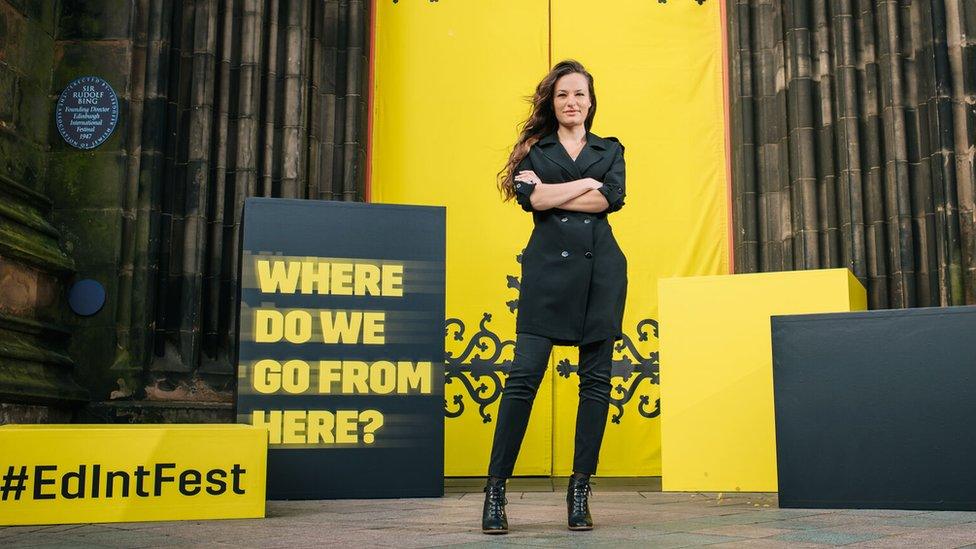Benedetti aims for 'relatable' Edinburgh International Festival
- Published

Nicola Benedetti has announced her first programme as director of the Edinburgh International Festival (EIF).
The Grammy award-winning musician is the first Scot to hold the post.
She has promised to deliver the deepest possible experience, with the highest quality performances, to the broadest possible audience.
Among the 2,000 artists taking part in this year's festival are Alison Goldfrapp, Anoushka Shankar, John Cale, Matthew Herbert and Sir Andras Schiff.
The Edinburgh International Festival runs from 4-27 August.
The Budapest Festival Orchestra will perform four concerts at the festival as part of a residency under conductor Iván Fischer.
That includes a performance of Dvořák's Eighth Symphony presented in the round, with the audience seated on beanbags amongst the orchestra.
There will be a similar insight into the London Symphony Orchestra, presented with an on-stage conversation from Nicola Benedetti and Sir Simon Rattle.
The Simón Bolívar Symphony Orchestra of Venezuela, will also be in residence at the International Festival.
The orchestra is the flagship of El Sistema - the music scheme which inspired Sistema Scotland and now has groups in Dundee, Glasgow, Aberdeen, Stirling and Edinburgh.
The scheme counts Ms Benedetti as a patron.
She is keen to encourage new audiences to the festival, as well as reassuring loyal regulars.
"I know the audiences and people of Scotland as I've been playing and talking to them my whole life," she said.
"The greatest things should not be kept to ourselves. I understand why some people don't feel comfortable.
"We have to harness our storytelling as a festival, and make it as relatable as possible to everyone and anyone from all walks of life. I want the Summer of 2023 to feel personal."


Like most festivals, EIF wants to be big and bold, but if it wants to remain relevant in the 21st century, it also has to be sustainable.
International artists may no longer arrive by train, or ship as they did in the early days of the festival but they will stay longer, either in Edinburgh or in the wider UK.
The Budapest Festival Orchestra, London Symphony and Simon Bolivar Orchestra will all offer residencies as part of the 2023 programme.
They'll also offer various events which attempt to demystify the orchestra for newcomers, whether that's conversations onstage or listening on beanbags around the players.
But while there's intimacy, there's also epic art, which often spills out of conventional spaces and blurs the lines between artforms.
With 295 events - not to mention a whole film festival yet to be announced - it's an exciting return to form for a festival which may be old, but has plenty of life left.

Theatre includes Barrie Kosky's The Threepenny Opera from the Berliner Ensemble, Brazilian film and theatre director Christiane Jatahy's Dusk - based on Lars Von Trier's Dogville - and Tiago Rodrigues' As Far As Impossible, recounting the everyday lives of humanitarian workers in war zones.
There'll be a new production of Pina Bausch's take on Stravinsky's The Rite of Spring, with a cast of over 30 dancers from 14 African countries.
The biggest ever programme of Korean artists in the festival's 76 year history includes the KBS Symphony Orchestra in their first UK appearance, pianist Yeol Eum Son and violinist Clara-Jumi Kang, the Novus String Quartet, the National Changgeuk Company of Korea.
Trojan Women features original music by K-pop producer and Parasite and Squid Game composer Jung Jae-il, in collaboration with Ahn Sook-sun.
EIF will also partner with two other festivals, the Festival of Politics and the Edinburgh International Film Festival on a programme of events.